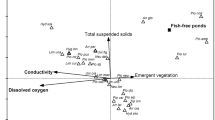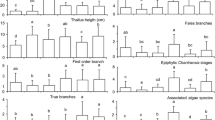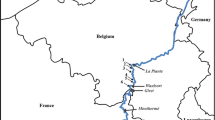Abstract
Aquatic macroinvertebrate communities are dependent on intrinsic environmental characteristics and biological interactions in microhabitat systems. We investigated the species–area relationships, detritus content input and trophic interactions of macroinvertebrate fauna in 46 Vrieseae friburguensis in a “Restinga” environment. Our hypotheses are that (i) bromeliad water volume and detritus content would positively affect the macroinvertebrate richness and abundance; (ii) predators would exercise a top-down effect on macroinvertebrates community; but (iii) will control the prey in different ways, due to the preference to occupy and stay in a spatial position on the bromeliad tank. We found 2201 macroinvertebrates from 18 taxa (12 preys and 6 predators). Higher water volume, detritus content and bromeliad area increased the richness and abundance of macroinvertebrates. Culicidae (swimming preys) coexist with predators due to the segregation in the use of the water column caused by the presence of Chironomidae (browsing preys). The opposite response of browsing and swimming preys to predator abundance suggests that trophic interactions are more important to swimming preys than for browsing ones, and this latter is more related to abiotic factors. Therefore, abiotic factors (mainly, water volume) and trophic interactions (abundance of predators) drive the macroinvertebrate community of bromeliad tanks in the studied Neotropical Restinga.


Similar content being viewed by others
References
Alvim EACC, Medeiros AO, Rezende RS, Gonçalves Júnior JF (2014) Leaf breakdown in a natural open tropical stream. J Limnol 74:248–260. https://doi.org/10.4081/jlimnol.2014.982
Anderson AM, Ferrington LC (2012) Resistance and resilience of winter-emerging Chironomidae (Diptera) to a flood event: implications for Minnesota trout streams. Hydrobiologia 707:59–71. https://doi.org/10.1007/s10750-012-1406-4
Armbruster P, Hutchinson RA, Cotgreave P (2002) Factors influencing community structure in a South American tank bromeliad fauna. Oikos 96:225–234. https://doi.org/10.1034/j.1600-0706.2002.960204.x
Blanchet FG, Legendre P, Borcard D (2008) Forward selection of explanatory variables. Ecology 89:2623–2632. https://doi.org/10.1890/07-0986.1
Barrancos EPF, Reid JL, Aronson J (2017) Tank bromeliad transplants as an enrichment strategy in southern Costa Rica. Restor Ecol 25:569–576. https://doi.org/10.1111/rec.12463
Biasi C, Tonin AM, Restello RM, Hepp LU (2013) The colonization of leaf litter by Chironomidae (Diptera): The influence of chemical quality and exposure duration in a subtropical stream. Limnologica 43:427–433. https://doi.org/10.1016/j.limno.2013.01.006
Büchi L, Vuilleumier S (2012) Dispersal strategies, few dominating or many coexisting: the effect of environmental spatial structure and multiple sources of mortality. PLoS ONE 7:e34733–e34733. https://doi.org/10.1371/journal.pone.0034733
Blaustein L, Schwartz SS (2001) Why study ecology in temporary pools? Israel J Zool 47:303–312
Cerezer C, Biasi C, Cogo GB, Santos S (2016) Avoid predation or take risks in basic activities? Predator-prey relationship in subtropical streams between decapods and caddisflies. Mar Freshw Res 67:1880–1887. https://doi.org/10.1071/MF15278
Cogliatti-Carvalho L, Rocha-Pessôa TC, Nunes-Freitas AF, Rocha CFD (2010) Water volume stored in bromeliad tanks in Brazilian restinga habitats. Acta Bot Bras 24:84–95. https://doi.org/10.1590/S0102-33062010000100009
Crawley MJ (2007) The R Book. Wiley, England
Cross WF, Benke AC (2002) Intra- and interspecific competition among coexisting lotic snails. Oikos 96:251–264. https://doi.org/10.1034/j.1600-0706.2002.960207.x
Cummins K, Merritt R, Andrade P (2005) The use of invertebrate functional groups to characterize ecosystem attributes in selected streams and rivers in south Brazil. Stud Neotrop Fauna E 40:69–89. https://doi.org/10.1080/01650520400025720
Cummins KW (1996) An introduction to the aquatic insects of North America. Kendall/Hunt Publishing Company, Dubuque
Cummins KW, Klug MJ (1979) Feeding ecology of stream invertebrates. Annu Rev Ecol Syst 10:147–172
Dézerald O, Leroy C, Corbara B et al (2017) Environmental drivers of invertebrate population dynamics in Neotropical tank bromeliads. Freshw Biol 62:229–242. https://doi.org/10.1111/fwb.12862
Dézerald O, Talaga S, Leroy C et al (2014) Environmental determinants of macroinvertebrate diversity in small water bodies: insights from tank-bromeliads. Hydrobiologia 723:77–86. https://doi.org/10.1007/s10750-013-1464-2
Dormann CF, Elith J, Bacher S, Buchmann C, Carl G, Carré G, Marquéz JRG, Gruber B, Lafourcade B, Leitão PJ, Münkemüller T, McClean C, Osborne PE, Reineking B, Schröder B, Skidmore AK, Zurell D, Lautenbach S (2013) Collinearity: a review of methods to deal with it and a simulation study evaluating their performance. Ecography 36:27–46. https://doi.org/10.1111/j1600-0587201207348x
Douglas M, Lake PS (1994) Richness of stream stones: an investigation of the mechanisms generating the species–area relationship. Oikos 69:387–396
Dufrêne M, Legendre P (1997) Species assemblages and indicator species: the need for a flexible asymmetrical approach. Ecol Monog 67:345–366. https://doi.org/10.1890/0012-9615(1997)067[0345:SAAIST]2.0.CO;2
Durães L, Roque FO, Siqueira T et al (2016) Simulating the role of connectivity in shaping stream insect metacommunities under colonization cycle dynamics. Ecol Model 334:19–26. https://doi.org/10.1016/j.ecolmodel.2016.04.020
Falkenberg DB (1999) Aspects of the flora and secondary vegetation in the Restinga from Santa Catarina State, South Brazil. Insula 28:1–30
Field MJR (2014) Aquatic invertebrate communities in tank bromeliads: how well do classic ecological patterns apply? Hydrobiologia 730:153–166. https://doi.org/10.1007/s10750-014-1831-7
Frank JH, Lounibos LP (2009) Insects and allies associated with bromeliads: a review. Terr Arthropod Rev 1:125–153. https://doi.org/10.1163/187498308X414742.Insects
Gonzalez AL, Romero GQ, Srivastava DS (2014) Detrital nutrient content determines growth rate and elemental composition of bromeliad-dwelling insects. Freshw Biol 59:737–747. https://doi.org/10.1111/fwb.12300
Guénard G, Legendre P (2017) Bringing multivariate support to multiscale codependence analysis: assessing the drivers of community structure across spatial scales. Methods Ecol Evol 9:292–304. https://doi.org/10.1111/2041-210X.12864
Hamada N, Ferreira-Keppler RL (2012) Guia Ilustrado de insetos aquáticos e semiaquáticos da Reserva Florestal Ducke. Editorada Universidade Federal do Amazonas, Manaus
Hamada N, Nessimian JL, Querino RB (2014) Insetos aquáticos na Amazônia brasileira: taxonomia, biologia e ecologia. INPA, Manaus
Hammill E, Atwood T, Srivastava SD (2015) Predation threat alters composition and functioning of Bromeliad ecosystems. Ecosystems 18:857–866. https://doi.org/10.1007/s10021-015-9866-9
Hutchinson GE (1959) Homage to Santa Rosalia or why are there so many kinds of animals? Am Nat 93:145–159
Kratina P, Petermann JS, Marino NAC et al (2017) Environmental control of the microfaunal community structure in tropical bromeliads. Ecol Evol 7:1627–1634. https://doi.org/10.1002/ece3.2797
Ladino G, Ospina-Bautista F, Estévez VJ, Jerabkova L, Kratina P (2019) Ecosystem services provided by bromeliad plants: a systematic review. Ecol Evol 9:7360–7372. https://doi.org/10.1002/ece3.5296
MacArthur RH, Wilson EO (1967) The theory of island biogeography. New Jersey.
Mahi A, Di Lorenzo T, Haicha B et al (2019) Environmental factors determining regional biodiversity patterns of groundwater fauna in semi-arid aquifers of northwest Algeria. Limnology 20:309–320. https://doi.org/10.1007/s10201-019-00579-x
Marino NAC, Srivastava DS, Farjalla VF (2013) Aquatic macroinvertebrate community composition in tank-bromeliads is determined by bromeliad species and its constrained characteristics. Insect Conserv Diver 6:372–380. https://doi.org/10.1111/j.1752-4598.2012.00224.x
Monteiro RF, Macedo MV (2014) First report on the diversity of insects trapped by a sticky exudate of the inflorescences of Vriesea bituminosa Wawra (Bromeliaceae: Tillandsioideae). Arthropod-Plant Interact 8:519–523. https://doi.org/10.1007/s11829-014-9332-1
Nogueira TMP, Pinto CRC (2016) O ordenamento ocupacional na gestão de unidades de conservação inseridas no espaço urbano: o caso do Parque Municipal da Lagoa do Peri (Florianópolis-SC). In: Congresso Nacional de Excelência em Gestão, pp 1–16.
Oksanen J, Blanchet FG, Kindt R, Legendre P, Minchin PR, Hara RB, Simpson GL, Solymos P, Stevens H, Wagner H (2013). Community ecology package: ordination, diversity and dissimilarities. Version 2. 0–8.
Paula Júnior AT, Rosa BFJV, Alves RG et al (2017) Aquatic invertebrates associated with bromeliads in Atlantic Forest fragments. Biota Neotrop 17:e20160188. https://doi.org/10.1590/1676-0611-bn-2016-0188
Petermann JS, Farjalla VF, Jocque M et al (2015) Dominant predators mediate the impact of habitat size on trophic structure in bromeliad invertebrate communities. Ecology 96:428–439
Pett-Ridge J, Silver WL (2002) Survival, growth, and ecosystem dynamics of displaced bromeliads in a montane tropical forest. Biotropica 34:211–224
Pires APF, Marino NAC, Srivastava DS, Farjalla VF (2016) Predicted rainfall changes disrupt trophic interactions in a tropical aquatic ecosystem. Ecology 97:2750–2759. https://doi.org/10.1002/ecy.1501
Pires APF, Srivastava DS, Marino NIAC, Macdonald AAM, Barros MPF, Farjalla VF (2018) Interactive effects of climate change and biodiversity loss on ecosystem functioning. Ecology 99:1203–1213. https://doi.org/10.1002/ecy.2202
Quintão JMB, Rezende RS, Júnior JFG (2013) Microbial effects in leaf breakdown in tropical reservoirs of different trophic status. Freshw Sci 32:933–950. https://doi.org/10.1899/12-112.1
Rezende RS, Leite GFM, De-Lima AKS et al (2015) Effects of density and predation risk on leaf litter processing by Phylloicus sp.: density and predation in Phylloicus sp. Austral Ecol 40:693–700. https://doi.org/10.1111/aec.12236
Rezende RS, Santos AM, Medeiros AO, Gonçalves JF Jr (2017) Temporal leaf litter breakdown in a tropical riparian forest with an open canopy. Limnetica. https://doi.org/10.23818/limn.36.14
Richardson BA (1999) The bromeliad microcosm and the assessment of faunal diversity in a Neotropical forest. Biotropica 31:321–336. https://doi.org/10.1111/j.1744-7429.1999.tb00144.x
Roberta S, Ferreira-Keppler RL (2011) Macroinvertebrates inhabiting the tank leaf terrestrial and epiphyte bromeliads at Reserva Adolpho Ducke, Manaus, Amazonas. Braz Arch Biol Technol 54:1193–1202
Schulz G, Siqueira T, Stefan G, Roque FO (2012) Passive and active dispersers respond similarly to environmental and spatial processes: an example from metacommunity dynamics of tree hole invertebrates. Fundam Appl Limnol 181:315–326. https://doi.org/10.1127/1863-9135/2012/0365
Schweiger O, Betzholtz P, Franze M (2012) Species–area relationships are controlled by species traits. PLoS ONE 7:e37359–e37359. https://doi.org/10.1371/journal.pone.0037359
Tjørve E, Kunin WE, Polce C, Tjørve KMC (2008) Species–area relationship: separating the effects of species abundance and spatial distribution. J Ecol 96:1141–1151. https://doi.org/10.1111/j.1365-2745.2008.01433.x
Valente-Neto F, Dur L, Fabio S (2017) Metacommunity detectives: confronting models based on niche and stochastic assembly scenarios with empirical data from a tropical stream network. Freshw Biol 63:86–99. https://doi.org/10.1111/fwb.13050
Wooster D (1994) Predator impacts on stream benthic prey. Oecologia 99:7–15. https://doi.org/10.1007/bf00317077
Acknowledgements
RSR is grateful to the National Council for Scientific and Technological Development (CNPq) and Chico Mendes Institute for Conservation of Biodiversity (ICMBio) in Projects Number 421288/2017–5 and 405290/2018–7. We thank the logistic support from the Foundation to Support the Research and Innovation of State of Santa Catarina (FAPESC) and the Community University of the Chapecó Region (Unochapecó; Ar. 171 no 23/2019 and UNIEDU no 013/2019).
Author information
Authors and Affiliations
Corresponding author
Additional information
Publisher's Note
Springer Nature remains neutral with regard to jurisdictional claims in published maps and institutional affiliations.
Handling Editor: Roger P. Mormul.
Rights and permissions
About this article
Cite this article
Rezende, R.S., Kroth, N., Capitanio, B.M. et al. Abiotic factors and trophic interactions affect the macroinvertebrate community of bromeliad tanks in a Neotropical Restinga. Limnology 21, 275–285 (2020). https://doi.org/10.1007/s10201-020-00614-2
Received:
Accepted:
Published:
Issue Date:
DOI: https://doi.org/10.1007/s10201-020-00614-2




